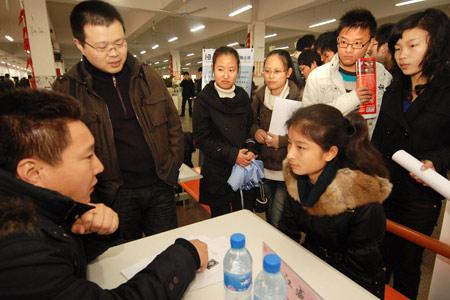
An employment fair for private companies in Nanjing, Jiangsu province.[China Daily]
Finding talented employees has become a major stumbling block for private Chinese firms keen on broadening their economic horizons. And even when they do offer market prices for skilled help, members of today's talent pool are often hesitant to join local companies.Take for example 27-year-old Xiao Wu, a senior consultant with a multinational accounting firm and keen to move up the corporate ladder.
When offered a high-paying position as chief finance officer of a private, Chinese education firm with overseas IPO plans in the works, the college graduate was hesitant to take the job.
"Private Chinese companies are not good at management, and I don't know whether my efforts will be recognized by colleagues that have already worked there for many years," Wu said.
The bid for competent and experienced employees has become a serious challenge for private Chinese companies in the IPO process both at home and abroad. The hurdles are also high for firms looking to internationalize after solid domestic growth over the past 30 years fueled by economic globalization, technological innovation and industrial upgrades, according to a survey released yesterday by an international human resource company, Manpower.
The survey of 166 Chinese private companies, held in 10 cities in Zhejiang, Jiangsu, Guangdong and Fujian provinces, was conducted from August to September 2009. These geographic regions were selected as they are the bases home to many local, privately owned enterprises.
A total of 41 percent of survey respondents indicated they have experienced difficulty in attracting international market development staff. Listed companies or enterprises poised to enter the IPO process predict overhauling their organizational structure and management system will be their main challenges.
According to the survey, private companies suffer from low retention rates for foreign talent, inaccurate job descriptions, and inexperience in recruiting, both regionally and globally.
Overall, 54 percent of surveyed companies said research and development as well as design staff are the most sought after, followed by sales, production and technical staff.
At the managerial level, 88 percent of recruits are HR professionals, while 71 percent are production and quality control personnel.
At the non-managerial level, procurement and customer service staff are in the greatest demand.
"The urgent need for HR professionals indicates that Chinese private companies are starting to realize how weak they are in terms of HR management, and that they must strive to improve it," said Yuan Jianhua, managing director of Manpower China.
Yuan added if Chinese private companies want to succeed in the talent war with multinational companies, they should work on building their brands, improving management systems and establishing a scientific decision-making mechanism to cultivate a framework suitable for developing and growing great talent.





